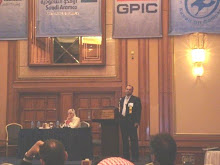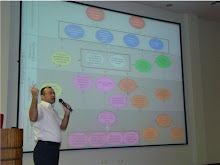With organisational maturity as a baseline, a separate temporary structure is created by developing integrated programmes of projects (Partington,2000) thus strategic change will be managed outside existing culture in a way to integrate projects and business as usual (Murray-Webster et al, 2000).
Configuring strategic/goal oriented programmes (fig below) aims at co-ordination and integration of continuous strategic initiatives across the organization supplemented by portfolio (chunked) and incremental (heartbeats) programmes (Kippenberger, 2000).
Adopting the eco-cycle, presented by Michel Thiry (2000), for programmes to integrate both types of change: deliberate (formal planned top-down strategic change) and emergent (unplanned bottom-up triggered by unanticipated inputs). It consists of two loops, learning and performance. While deliberate change goes through the performance loop (top-down), feedback, and unplanned changes go through the learning loop (multi directional) that facilitates new deliberate decisions (value management).

Figure: The programme eco-cycle, adopted from Thiry, 2000
This method can be employed in Okumus (2003) case to implement strategic changes; however there are many others methodologies that can still be explored.
Regards,
Samer

 Harold Ainsworth scrutinized many researches aimed at identifying main causes of project abandonment; these consolidated into three main broad lines (Ainsworth, 1998):
Harold Ainsworth scrutinized many researches aimed at identifying main causes of project abandonment; these consolidated into three main broad lines (Ainsworth, 1998):















